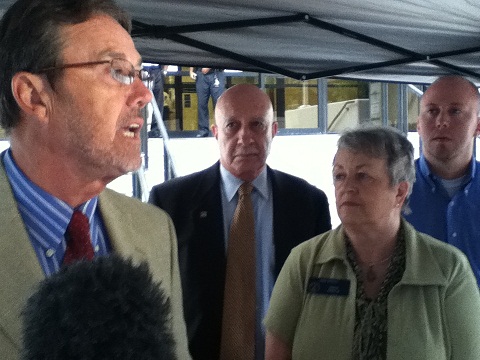Debate over unemployment insurance continues

Charles Edwards / WABE
It may be next month before the debate over Georgia’s move not to allow seasonal workers to qualify for unemployment insurance is resolved.
The U.S. Department of Labor has given Georgia’s Labor Department until September 2nd to respond to the federal decision, which asked Georgia to “cease administering this regulatory and policy change immediately”. Georgia’s Labor Commissioner intends to fight the decision.
Everton Daswell is waiting on the decision. He works for First Transit. The private company operates campus shuttle service for Kennesaw State University. Daswell has worked for the company for the last 5 years.
“We were given unemployment yearly each time that the school goes off for summer vacation,” said Daswell.
Last summer, Daswell collected at least $200 a week in unemployment benefits. The money came from Georgia’s unemployment trust fund. Money in the fund comes from a state tax paid by companies. This summer, the state denied Daswell’s unemployment insurance request. Without that money, he says he’s fallen behind.
“Bills and everything not being paid for over 4 months,” said Daswell.
Charlie Fleming, President of the AFL-CIO’s Georgia chapter, says Daswell is one of many seasonal employees of private companies with public contracts.
“Thousands of other contractual that are employed drove buses, they cleaned toilets, they serve meat loaf in our schools and across this state,” said Fleming.
Georgians have received unemployment checks for decades. But some of them should have never qualified for those benefits according to Georgia Labor Commissioner Mark Butler.
“What we found out a little over a year ago was that we were treating workers in this area differently depending on how they were being paid,” said Butler.
Butler says seasonal public school employees never qualified for unemployment insurance. But, seasonal private employees working for public schools have been accepted for those benefits.
“State law does not make a difference between private and public. It says any,” said Butler. “What we have been trying to do is basically enforce what we believe is on the books on state law correctly.”
The U-S Department of Labor disagrees. It sent a letter to the state saying Georgia should return to its previous way of operating the program. Commissioner Butler acknowledges the federal decision could stand.
“We’ll have to cross that bridge when we get to it. But, right now we’re currently working with the Attorney General’s office to look and see what our options are.”
In the end, Everton Daswell hopes to collect a summer’s worth of unemployment checks.
“If they really give us this money, it just goes back to paying back all these people that I’ve borrowed from to stay above the waters,” said Daswell.
While Daswell and others wait, some return back to work with the new school year.
9(MDAxODM0MDY4MDEyMTY4NDA3MzI3YjkzMw004))







